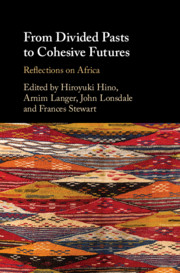Book contents
- From Divided Pasts to Cohesive Futures
- From Divided Pasts to Cohesive Futures
- Copyright page
- Contents
- Figures
- Tables
- Contributors
- Foreword
- Acknowledgments
- Introduction: Understanding Processes of Change in Social Cohesion: Learning from Comparative History
- Part I Social Cohesion in Africa: Case Studies of Past and Present
- Part II Policies and Institutions for Social Cohesion
- 6 Redressing Inequalities in Societies
- 7 Vertical and Horizontal Decentralisation for Equity and Stability
- 8 Land Reform
- 9 Protecting Education from Ethnic Politics
- 10 Building Social Cohesion through Education in Africa? Lessons from Côte d’Ivoire and Kenya
- 11 Remaking Cape Town
- 12 Key Ingredients of Inclusive Politics
- Part III Conclusions and Policy Recommendations
- Index
- References
9 - Protecting Education from Ethnic Politics
from Part II - Policies and Institutions for Social Cohesion
Published online by Cambridge University Press: 05 August 2019
- From Divided Pasts to Cohesive Futures
- From Divided Pasts to Cohesive Futures
- Copyright page
- Contents
- Figures
- Tables
- Contributors
- Foreword
- Acknowledgments
- Introduction: Understanding Processes of Change in Social Cohesion: Learning from Comparative History
- Part I Social Cohesion in Africa: Case Studies of Past and Present
- Part II Policies and Institutions for Social Cohesion
- 6 Redressing Inequalities in Societies
- 7 Vertical and Horizontal Decentralisation for Equity and Stability
- 8 Land Reform
- 9 Protecting Education from Ethnic Politics
- 10 Building Social Cohesion through Education in Africa? Lessons from Côte d’Ivoire and Kenya
- 11 Remaking Cape Town
- 12 Key Ingredients of Inclusive Politics
- Part III Conclusions and Policy Recommendations
- Index
- References
Summary
By comparing the educational attainment of Kenyans whose years of primary schooling did and did not correspond with the tenure in office of a president from their own ethnic group, we provide evidence suggesting that Kenyan presidents have favored their coethnics in the allocation of educational resources. We discuss the implications of such bias, emphasizing that the main impact is to reinforce perceptions of ethnic favoritism in government allocation decisions that, in turn, fosters resentment across group lines, undermines trust in government, and raises the stakes of elections. We suggest that protecting education from ethnic politics might be achieved by three means: devolution, which may limit executive power and discretion over the distribution of resources; fostering public awareness and social mobilization in favor of more equity in the education sector; or the promotion of private schools as an alternative to the state-sponsored educational sector.
- Type
- Chapter
- Information
- From Divided Pasts to Cohesive FuturesReflections on Africa, pp. 300 - 321Publisher: Cambridge University PressPrint publication year: 2019

